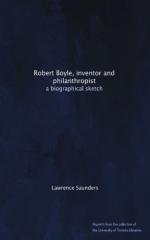|
This section contains 1,726 words (approx. 6 pages at 300 words per page) |

|
Born at Lismore Castle in Munster, Ireland, on January 25, 1627, Robert Boyle (1627–1691) was an experimentalist who made fundamental contributions to chemistry, hydrostatics, philosophy of science, and the relationship between science and religion, including morality and natural theology. Before he penned his first work on natural philosophy, the deeply pious Boyle wrote several essays and treatises on religious themes, and his early interests in morality, theology, and casuistry remained undiminished throughout his life. In some of his most important mature works he linked his religious interests explicitly with his scientific pursuits, but implicit connections are often just beneath the surface in many of his writings.
The intensity of Boyle's interest in moral philosophy is readily seen in his earliest treatise, the Aretology, an unpublished work on ethics, vocation, and self-knowledge. This work reflects influences from Aristotle and the Christian humanist tradition, especially the German theologian Johann Alsted (1588–1638), whose...
|
This section contains 1,726 words (approx. 6 pages at 300 words per page) |

|


